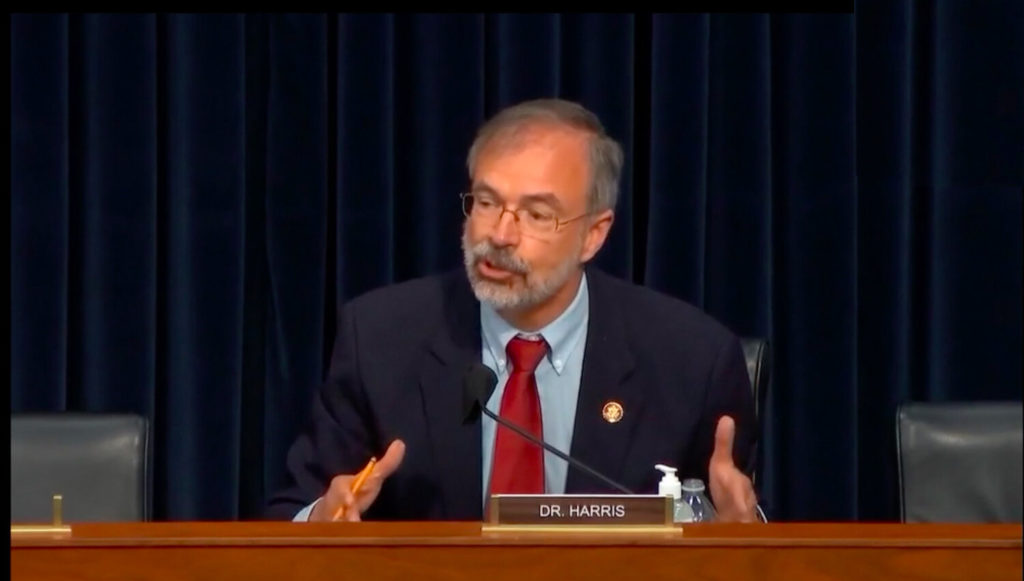Maryland’s only Republican congressman and all-around enemy to cannabis reform Andy Harris has been in the news lately, battling with Maryland governor Larry Hogan regarding “stay at home” orders tied to the COVID-19 pandemic and it seems, expressing disappointment that the virus has only killed nearly 100,000 Americans.
“They promised two million dead at the beginning of this,” Politico reported Harris said during a tele-town hall. “The media has a vested interest in making things sound worse so that you tune in the next day.”
At a May 6 House of Representatives hearing about COVID-19, Harris—who isn’t above calling COVID-19 the “Wuhan virus”— was confronted with an argument from Tom Frieden, a former director of the Centers for Disease Control and Prevention (CDC), about waiting for contact tracing and other sophisticated methods that make Americans safer, argued, “We’re safer if we’re not born. We’re safer from death if we’re not born, right? I mean, the bottom line is there’s some element of risk.”
At the same time, Harris has argued for more education regarding social distancing, wearing masks, and washing hands and last week, announced funding of more than $1.5 million to a number of health centers on Maryland’s Eastern Shore. In a statement regarding the funding however, he pivoted back to Reopen-style rhetoric.
“We have successfully flattened the curve in much of the country, and this additional funding will allow our local communities on the Eastern Shore to continue testing when it is appropriate,” Harris said. “Unemployment, bankruptcy, and poverty have severe health consequences as well as long-lasting economic impact. A bad economy is bad for health. Hopefully the increased testing capacity we have now can allow us to rapidly re-open low risk businesses while we concentrate on employees in high risk businesses like nursing homes and meat processing plants.”
These occasional genuflections to health and science (Harris is an anesthesiologist) amid right-wing rhetoric are familiar to those who have been worried about Harris for years: Cannabis advocates.
For them, Harris will always be the congressman whose rider—derisively known as “The Harris Rider”—prevented Washington DC from being able to have a proper commercialized cannabis industry. As Rolling Stone put it in 2017, “Harris is known as legal marijuana’s greatest foe, because he successfully got Congress to step in and block local Washington officials from setting up a regulatory regime for weed after voters overwhelmingly approved recreational marijuana at the ballot box.”
At the time it was pointed out by the website ATTN that one of Harris’ major donors was a Rockville pharmaceutical company, Emergent BioSolutions, that focused on pain relief for chemotherapy patients. ATTN wrote, “cannabis is a huge combatant against many of the deleterious effects of cancer and chemotherapy, and thus a hugely disruptive threat to Emergent’s business model.”
Last month, DC Congresswoman Eleanor Holmes Norton demanded Congress remove the rider that prevents DC from using local funds to establish a commercial recreational cannabis industry in the District, the latest in her nearly six-year battle against Harris’ rider and related to efforts to prevent DC from having commercial cannabis. Part of Norton’s reason for the demand is COVID-19, which has left many cities cash-strapped and due to federal funding categorization, DC in particular. The district was provided with less federal funding than expected. “At this moment of unparalleled need, DC should be able to collect tax revenue from all available sources, like every other jurisdiction, including from recreational marijuana, which is believed to be widely used in the District,” Norton said.
Harris, who again, is a doctor, has also claimed cannabis is a “gateway drug” (growing research suggests cannabis is not a gateway drug but an “exit drug,” helpful for those trying to stop using opioids). But he has also cosponsored a bill expanding the ability to research cannabis. But maybe the most useful way to look at Harris’ often contradictory stances is to consider how he treated a protest against him by cannabis advocates and his involvement in the burgeoning—and dangerous—Reopen movement.
In 2018, two pro-cannabis demonstrators entered Harris’ office in protest of his anti-legalization stance. He closed the door on them. The protesters, part of Maryland Marijuana Justice, proceeded to light up joints in the hallway outside of Harris’ office. They were arrested. Harris made a big deal about the protest, penning an entire op-ed about it and claiming he received a bruised wrist trying to hold the protesters back. He also criticized their style of protest and general political discourse.
“Today’s aggression by protesters who disagree with my position on the legalization of recreational marijuana demonstrates the problem with political discourse today,” Harris said in a statement. “We all must agree to have a civilized debate when disagreement occurs.”
Harris’ stances on protesting and civility seem to have changed since 2018. He recently made an appearance at one of the “Reopen America” protests taking place in Salisbury, Maryland.
The growing—and over publicized and likely billionaire-funded—protests in which angry men and women and their children show up in public, sometimes wielding weapons and demand government ordesr that citizens stay at home to prevent the further spread of COVID-19 be lifted.
There Harris stood in a parking lot surrounded by fellow Reopen-ers waving Trump 2020 and “Don’t Tread On Me” flags and compared stay-at-home orders to “Communist China.”
While Maryland overall has seen a slight decrease in COVID-19 infections over the past few days, the virus is surging along the Eastern Shore which includes Salisbury.
After Reopen protests in Kentucky, Georgia, and Wisconsin, infection rates have dramatically increased. Polls show that most Americans support stay-at-home orders.
Polls also show that the majority of Americans support cannabis legalization.

